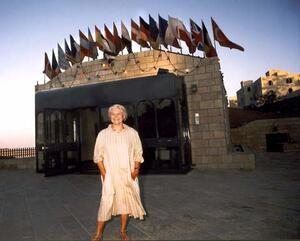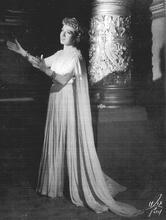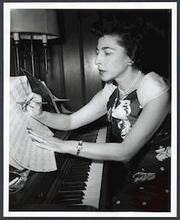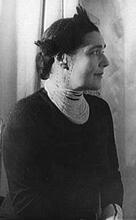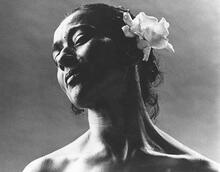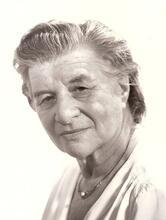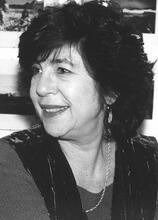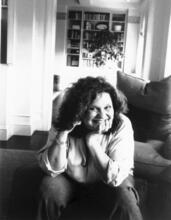Lia Van Leer
A pioneer in the field of art film programming and archiving in Israel, Lia van Leer was the founder of the Haifa Cinematheque, the Jerusalem Cinematheque, the Israel Film Archive, and the Jerusalem Film Festival. Van Leer moved to Jerusalem from Romania in 1943 to attend the Hebrew University, where she studied Humanities. She met and married Wim van Leer. Together they traveled abroad and developed their interest in international cinema, before returning to Israel and establishing the Haifa and Jerusalem Cinematheques. Van Leer was a unique individual who succeeded in establishing new institutions, inspired by her own vision and passion. As a result of her work, film is now seen as an expression of culture and art and is funded as such by government agencies.
Pioneer in the field of art film programming and film archiving in Israel, Lia van Leer was the founder of the Haifa Cinematheque, the Jerusalem Cinematheque, the Israel Film Archive, and the Jerusalem Film Festival.
Early Life and Family
Lia was born on August 8, 1924, in Beltsy (Balti, city in the region of Bessarabian Romania). Her father, Simon Greenberg, earned his living by exporting wheat while her mother, Olga, channeled her activities into volunteering for WIZO. Her upper-middle-class family was highly assimilated, attending synagogue only a few times a year. Lia attended a public high school and, with her family, spent summer holidays in the Carpathian mountains.
In 1940, her parents sent her on the long trip to Palestine to visit her sister Bruria, a dentist, who had emigrated in 1936 and was living in Tel Aviv. The sisters never saw their parents again. The Germans captured Beltsy in July 1941 and murdered their father together with other leaders of the Jewish community. Their mother and grandmother were deported to Transnistria, a region in the western Ukraine between the Bug and Dniester rivers, where they both died in the camps.
Move to Israel and Film Collection
Lia moved to Jerusalem in 1943 to attend the Hebrew University where she studied Humanities for two years. She met and fell in love with Wim van Leer (1913–1992), an engineer, pilot, journalist, playwright, and film producer. They married in 1952 and made their home in Haifa. Together they often traveled abroad, where they developed their interest in international cinema. During the 1950s the van Leers regularly invited friends to their home on Friday evenings to watch films, which they would screen on their own 16 mm projector. These social evenings were the precursor activities leading to the first film club in the country (created in 1956), which later developed into the Haifa Cinematheque. During these years, the van Leers were also instrumental in the creation of the Cinematheques in Tel Aviv (at the American Zionist House) and in Jerusalem (at Beit Hillel). In addition, they traveled by jeep to A voluntary collective community, mainly agricultural, in which there is no private wealth and which is responsible for all the needs of its members and their families.kibbutzim, showing films that were otherwise unavailable. The films they screened were borrowed or acquired from abroad, and slowly they began to build their own personal collection of international film classics. This personal collection grew into the first film archive in the State of Israel, which was formally established as the Israel Film Archive in 1960 and accepted into the Fédération Internationale des Archives du Film in 1963.
The collection grew over the years to more than 26,000 films as van Leer approached international film companies and large Hollywood studios and requested that the distribution prints of their films, already subtitled into Hebrew, be deposited in her collection after the completion of their commercial run in the cinemas. This was a revolutionary idea, since distribution prints were usually destroyed after an average five-year period, but van Leer persevered and succeeded in receiving thousands of films in this manner. The Israel Film Archive collection, which emphasizes the collection and preservation of Israeli films, both features and documentaries, also includes the historically important collection of Carmel Newsreels, produced by Nathan Axelrod from 1934 to 1957.
Establishment of Film institutions
When the van Leers moved to Jerusalem in 1973, Lia van Leer was able to fulfill her dream of establishing an institution modeled after the Cinematheque Francaise. She established the Jerusalem Cinematheque (which met for many years in Beit Agron) and then, with the assistance of Mayor Teddy Kollek, the Ostrovsky family, and the Jerusalem Foundation, built a magnificent permanent home for the Jerusalem Cinematheque overlooking the walls of the Old City.
The new premises (opened in 1981), called the Jerusalem Film Center, house the Jerusalem Cinematheque, the Israel Film Archive, and the annual Jerusalem Film Festival (established in 1983). Each of these institutions was founded and directed by van Leer, on a full-time volunteer basis. The Jerusalem Film Center has had an impact far beyond its walls. It is responsible for inculcating in the hearts and minds of thousands of young people the importance of international cinema as a means of communication and understanding; it is a meeting place for Arabs and Jews to discuss cultural issues rather than political ones; the Israel Film Archive provides hundreds of films annually for screenings all over Israel and around the world; the Jerusalem Film Festival attracts distinguished film personalities and provides them with the possibility of meeting local audiences and discussing the art of cinema.
Legacy
Lia van Leer was a unique individual who succeeded in establishing new institutions, inspired by her own vision and passion.
In 1995, Van Leer was recognized in the international movie scene and served as president of the Berlin International Film Festival jury and on the Festival de Cannes jury. Van Leer was awarded the Ordre National du Mérite from the French government, an honor presented by president François Mitterand.
In a country where film had been primarily seen as a form of entertainment or a means of propaganda, van Leer, through her untiring efforts, helped change that image and raise filmmaking and film appreciation to a new level. In 2004, van Leer was awarded the Israel Prize for these accomplishments. As a result of van Leer’s work, film in Israel is now seen as an expression of culture and art and is funded as such by government agencies.
Van Leer passed away on March 13, 2015, at the age of 90.
Honors and Awards
Member of the Jury, Cannes Film Festival, 1983.
President of the Jury, Berlin Film Festival, 1995
Medal of the City of Jerusalem.
Medal of the City of Tel Aviv.
President’s Citation for Volunteerism, presented by President Chaim Herzog, 1988.
Medal for Contribution to Cinema, Israeli Ministry of Education.
Ordre du Merite, France, presented by President Mitterand.
Chevalier des Arts et des Lettres, France; Chevalier de la Legion d’Honneur.
Honorary Fellow, Spiegel Film and Television School of Jerusalem.
Life Achievement Award, Israel Film Academy Awards.
Jerusalem Foundation Prize in Honor of Teddy Kollek, 1999 – Presented to Lia van Leer, in recognition of her life’s work and contribution to the advancement of cinema in Jerusalem and her success in using the medium of film as a powerful educational tool, and as a means for promoting dialogue, creative expression, and understanding that extends beyond all borders. In 2004 she was awarded the Israel Prize.
Brown, Hannah. "Lia van Leer: Founder of Jerusalem Film Festival and Israel's Cinematheques." Jewish Quarterly 62, no. 2 (2015): 88-90.
Le Roy, Eric. "Entretien avec Lia van Leer." Journal of Film Preservation 92 (2015): 28.
Obituary Jerusalem Post. https://www.jpost.com/israel-news/culture/lia-van-leer-israeli-movie-pi…
Schnitzer, Meir, and Lia van Leer. Israeli cinema: facts, plots, directors, opinions: the first complete lexicon of Israeli films 1932-1993. Kinneret Publishing House, 1994.

